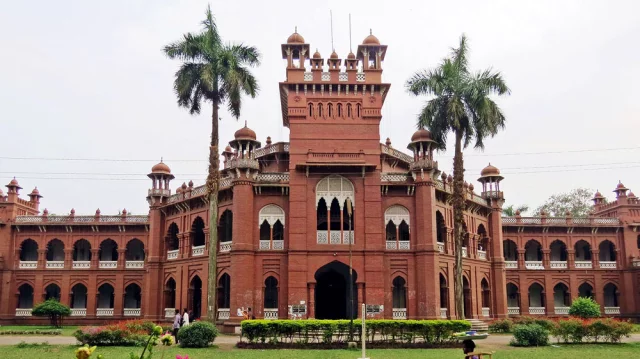
Private and Public University Introduction
Bangladesh provides a wide range of higher education options through its public and private universities, each offering unique features for prospective students. Public universities, like Dhaka University and BUET, are known for their tough admission tests and almost free education. In contrast, private universities such as North South University and BRAC University offer alternative routes with tuition fees, but they often provide better facilities and a more organized academic experience.
Check out top 7 preparation strategies for Dhaka University admission test
Factors to Think About When Comparing Public and Private Universities
Admission Process and Competition
Public universities in Bangladesh are known for their highly competitive admission processes, primarily based on entrance exams. These exams play a crucial role in shaping a student’s future, leading to intense preparation and stress. On the other hand, private universities generally have less competitive admissions, focusing more on academic qualifications rather than a single entrance exam. This can reduce the stress for students who excel academically but may not perform as well in standardized tests.
Quality of Education
While public universities offer education at a very low cost, the quality can vary. Some well-known public universities maintain high academic standards, but others struggle with challenges such as outdated curricula and limited resources. Private universities, however, tend to invest more in modern facilities and updated curricula. They often collaborate with international institutions, offering a more industry-relevant education that prepares students for the global job market.
Campus Facilities and Infrastructure
Public universities, despite their low fees, often face challenges with inadequate infrastructure. Issues like overcrowded classrooms, limited housing, and outdated libraries can affect the overall learning experience. In contrast, private universities typically offer better facilities, including modern classrooms, well-stocked libraries, comfortable accommodations, and sometimes even transportation services. These amenities contribute to a more supportive learning environment.
Session Duration and Management
Public universities frequently encounter session jams—delays in the academic calendar due to strikes or administrative issues—resulting in prolonged degree completion times. Private universities usually follow a more structured academic calendar, helping students to complete their degrees on time. This predictability is beneficial for students who want to graduate and enter the workforce without delays.
Social Recognition and Career Prospects
In Bangladesh, graduates from public universities often enjoy higher social recognition and prestige. This societal respect can influence career opportunities and social status after graduation. While private universities are gaining respect, especially those with strong reputations and alumni networks, graduates might initially face skepticism compared to those from public universities. However, strong academic performance and industry connections can help overcome this over time.
Our Tips for Choosing the Right University for You

Check out the official website of North South University for latest information about admission
Assess Your Academic Strengths: If you do well in competitive exams and thrive in a challenging academic setting, public universities might be a good fit for you, despite some potential difficulties.
Consider Financial Implications: Public universities often provide almost free education, but you might face challenges related to living conditions and infrastructure. On the other hand, private universities usually offer better facilities, though the costs can vary significantly depending on the institution.
Evaluate Long-Term Goals: Reflect on your career goals and how each university’s reputation, connections, and alumni network align with those goals.
Visit Campuses and Talk to Students: If you can, visit the campuses to see the facilities yourself and talk to current students to get a sense of their real-life experiences.
Seek Guidance: Talk to teachers, career counselors, and alumni to get their perspectives on different universities and help you make an informed choice.
In summary, while public universities in Bangladesh offer affordable education and social prestige, private universities provide enhanced facilities and potentially a smoother academic experience. Considering these aspects and how they match with your personal goals will guide you in choosing the best option for a fulfilling university experience.
What Students Say About Private and Public Universities in Bangladesh
Students from both public and private universities in Bangladesh have shared valuable insights that can guide prospective students in making informed decisions about their educational path. Here are some important points to consider based on their experiences:
Outcome Matters More Than Institute: Many students believe that what you achieve is more important than the name of the school you attend. Nasim Ul Haque Asif put it simply: “It’s all about effort. In the end, the outcome matters, not your institute.”
Brand Perception and Value: Nafisul Abrar talked about how people view different universities: “A public university’s brand is seen as valuable, but top private ones like NSU and BRAC are also held in high regard.” He pointed out that public universities often have big alumni networks that can help when job hunting. Graduates from these public universities are well-represented in many organizations in Bangladesh, giving you a solid network. While the brand of the university can play a role in job recruitment, how well you do academically and in extracurriculars is more important. The difference between public and private universities isn’t huge if you have strong credentials.
Misconceptions and Realities: Foysal Bin Amin tackled some myths about private universities: “People often think private universities just admit anyone or sell degrees. But from my experience, I haven’t seen a big difference in talent.” He added, “As a hiring manager, I’ve found that where someone studied matters less than how they’ve developed as a person.”
Societal Attitudes and Challenges: Montasirul Alam Shahed talked about how people view private universities: “There’s a common bias that favors public universities because of their long history.” He suggested that highlighting what private universities achieve, without comparing them directly to public ones, could help change these views. Shahed also noted financial issues: “Public education is nearly free, so it’s a more affordable option for many middle-class families.” He shared his own story: “I had to pick a public university because I couldn’t afford a private one.”
These insights show that choosing between public and private universities should be about what fits your personal goals, budget, and what each school offers, rather than just societal opinions.
Interviewee details
Special thanks goes to the students who gave us necessary insights about public and private university. This will help admission seekers to make better decision based on their needs.
Nasim Ul Haque Asif (CSE, University of Dhaka): He believes that effort is what really matters, not the name of the institution. He put it simply: “It’s all about effort. In the end, the outcome matters, not your institute.”
Nafisul Abrar (BBA, Institute of Business Administration, University of Dhaka): He pointed out that while public universities are often seen as prestigious, top private universities like NSU and BRAC are also well-regarded. He emphasized the value of alumni networks for job hunting and suggested that choosing between public and private universities should fit your personal goals and circumstances.
Foysal Bin Amin (EEE, International Islamic University, Chittagong): He tackled the myths about private universities, such as the idea that they admit anyone or sell degrees. From his experience, he found that personal development and skills are far more important than the name of the institution.
Montasirul Alam Shahed (Botanical, Jahangirnagar University): He talked about the common bias that favors public universities because of their long history. He also noted that public education is more affordable, making it accessible for many middle-class families. He shared his own experience of choosing a public university due to financial reasons, even though he recognizes the achievements of private universities.